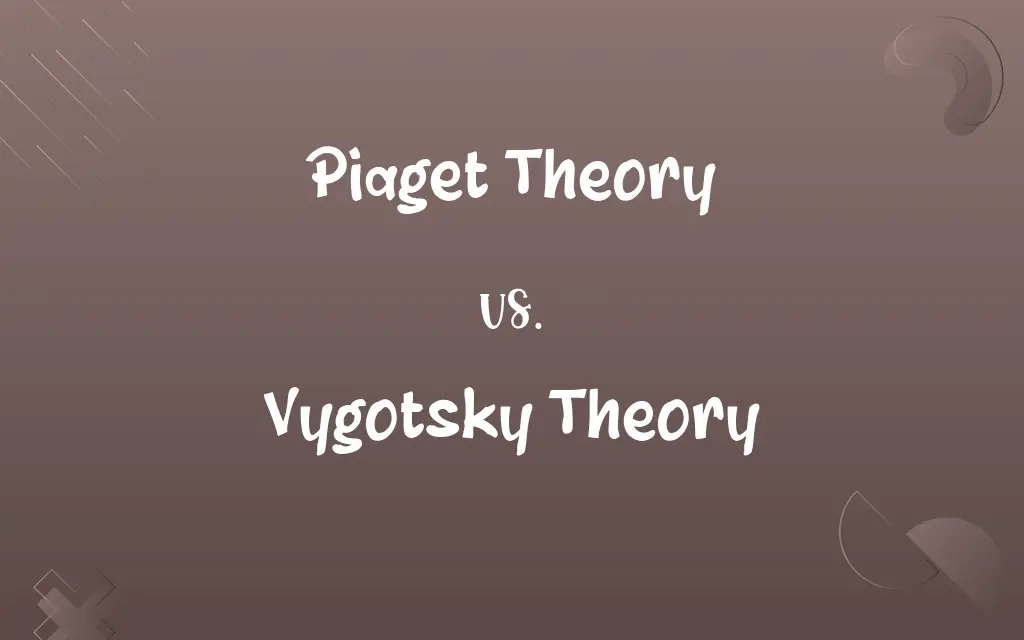Piaget Theory vs. Vygotsky Theory: Know the Difference

By Shumaila Saeed || Published on December 30, 2023
Piaget's Theory focuses on stages of individual cognitive development; Vygotsky's Theory emphasizes social interaction and cultural context in learning.

Key Differences
Piaget's Theory of cognitive development outlines distinct stages through which children progress. In contrast, Vygotsky's Theory emphasizes the importance of social and cultural influences on cognitive development.
Shumaila Saeed
Dec 30, 2023
Piaget believed learning is a process of individual discovery and construction of knowledge. Vygotsky, however, viewed learning as a socially mediated process, greatly influenced by interaction with others.
Shumaila Saeed
Dec 30, 2023
In Piaget's Theory, language is a result of cognitive development. Conversely, Vygotsky's Theory posits that language is fundamental to cognitive development and is developed through social interactions.
Shumaila Saeed
Dec 30, 2023
Piaget's Theory emphasizes the role of active exploration by the child in learning. Vygotsky's Theory, on the other hand, focuses on the role of guidance and instruction from more knowledgeable others.
Shumaila Saeed
Dec 30, 2023
Piaget's Theory is centered around the concept of schemas and how they evolve. In contrast, Vygotsky's Theory introduces the concept of the Zone of Proximal Development, which defines what a learner can do with help.
Shumaila Saeed
Dec 30, 2023
ADVERTISEMENT
Comparison Chart
Learning Process
Individual discovery and knowledge construction
Socially mediated, influenced by others
Shumaila Saeed
Dec 30, 2023
Role of Language
Result of cognitive development
Fundamental to cognitive development
Shumaila Saeed
Dec 30, 2023
Child’s Role in Learning
Active exploration
Interaction and guidance from others
Shumaila Saeed
Dec 30, 2023
Key Concepts
Schemas and cognitive stages
Zone of Proximal Development and social learning
Shumaila Saeed
Dec 30, 2023
ADVERTISEMENT
Piaget Theory and Vygotsky Theory Definitions
Piaget Theory
Centers on children's interaction with their physical environment.
Piaget's Theory suggests that interacting with objects is crucial for cognitive development in infants.
Shumaila Saeed
Dec 04, 2023
Vygotsky Theory
Involves learning through interaction and guidance.
Vygotsky's Theory supports collaborative learning in classrooms for cognitive growth.
Shumaila Saeed
Dec 04, 2023
Piaget Theory
Focuses on stages of cognitive development.
Piaget's Theory explains why toddlers engage in parallel play.
Shumaila Saeed
Dec 04, 2023
Vygotsky Theory
Emphasizes social and cultural influence on learning.
Vygotsky's Theory underscores the role of parents in teaching children language skills.
Shumaila Saeed
Dec 04, 2023
Piaget Theory
Views language as a result of cognitive growth.
Piaget's Theory would attribute a child's growing vocabulary to cognitive development.
Shumaila Saeed
Dec 04, 2023
ADVERTISEMENT
Vygotsky Theory
Focuses on the Zone of Proximal Development.
Vygotsky's Theory explains how a teacher's assistance helps students reach their learning potential.
Shumaila Saeed
Dec 04, 2023
Piaget Theory
Involves the adaptation of schemas.
Piaget's Theory describes how children adjust their schemas through assimilation and accommodation.
Shumaila Saeed
Dec 04, 2023
Vygotsky Theory
Views learning as a socially mediated process.
According to Vygotsky's Theory, group activities in school enhance cognitive development.
Shumaila Saeed
Dec 04, 2023
Piaget Theory
Emphasizes individual learning processes.
According to Piaget's Theory, children learn best through hands-on experiences.
Shumaila Saeed
Dec 04, 2023
Vygotsky Theory
Places importance on language in cognitive development.
Vygotsky's Theory would stress the significance of storytelling in a child's learning.
Shumaila Saeed
Dec 04, 2023
Repeatedly Asked Queries
What is the core focus of Piaget's Theory?
Piaget's Theory focuses on individual cognitive development through distinct stages.
Shumaila Saeed
Dec 30, 2023
How does Vygotsky's Theory view the learning process?
Vygotsky's Theory views learning as a process mediated by social interactions and cultural influences.
Shumaila Saeed
Dec 30, 2023
Can Piaget's Theory be applied to adult learning?
Piaget's Theory primarily focuses on childhood development and is less applicable to adult learning.
Shumaila Saeed
Dec 30, 2023
How does Vygotsky's Theory perceive language development?
Vygotsky's Theory considers language as a fundamental tool for cognitive development.
Shumaila Saeed
Dec 30, 2023
What is a schema in Piaget's Theory?
A schema in Piaget's Theory is a cognitive framework or concept that helps organize and interpret information.
Shumaila Saeed
Dec 30, 2023
What is the Zone of Proximal Development in Vygotsky's Theory?
The Zone of Proximal Development is a concept in Vygotsky's Theory that describes the range of tasks that a child can perform with the help and guidance of others.
Shumaila Saeed
Dec 30, 2023
What role does language play in Piaget's Theory?
In Piaget's Theory, language development is a result of cognitive development.
Shumaila Saeed
Dec 30, 2023
How does Vygotsky's Theory differ in focus?
Vygotsky's Theory centers on the impact of social interaction and cultural context on learning.
Shumaila Saeed
Dec 30, 2023
What does Piaget's Theory say about children's learning?
Piaget's Theory suggests children learn through active exploration and discovery.
Shumaila Saeed
Dec 30, 2023
What is the educational implication of Vygotsky's Theory?
Vygotsky's Theory implies the importance of collaborative learning and the role of teachers and peers in the learning process.
Shumaila Saeed
Dec 30, 2023
How does Vygotsky's Theory view play?
Vygotsky's Theory sees play as an important social activity that facilitates cognitive and language development.
Shumaila Saeed
Dec 30, 2023
What does Piaget's Theory say about problem-solving?
Piaget's Theory suggests that problem-solving skills develop progressively as children move through different stages of cognitive development.
Shumaila Saeed
Dec 30, 2023
Does Vygotsky's Theory include adult learning?
Vygotsky's Theory can be extended to adult learning, especially in the context of social learning and cultural influences.
Shumaila Saeed
Dec 30, 2023
Is Vygotsky's Theory relevant to special education?
Yes, Vygotsky's Theory is relevant to special education, especially in emphasizing the role of social interaction and scaffolding in learning.
Shumaila Saeed
Dec 30, 2023
How do educators use Piaget's Theory?
Educators use Piaget's Theory to tailor learning experiences according to the developmental stage of the child.
Shumaila Saeed
Dec 30, 2023
Can Piaget's Theory be applied to special education?
Yes, Piaget's Theory can be applied to special education by adapting teaching methods to the developmental stage of the child.
Shumaila Saeed
Dec 30, 2023
What are the stages in Piaget's Theory?
The stages in Piaget's Theory are Sensorimotor, Preoperational, Concrete Operational, and Formal Operational.
Shumaila Saeed
Dec 30, 2023
Does Vygotsky's Theory have defined stages?
Vygotsky's Theory does not outline specific stages like Piaget's; it focuses more on the continuous process of learning through social interactions.
Shumaila Saeed
Dec 30, 2023
What does Piaget's Theory say about play?
Piaget's Theory views play as a crucial aspect of cognitive development, allowing children to explore and understand their world.
Shumaila Saeed
Dec 30, 2023
How does Vygotsky's Theory approach problem-solving?
Vygotsky's Theory approaches problem-solving as a socially mediated process where learning from others plays a crucial role.
Shumaila Saeed
Dec 30, 2023
Share this page
Link for your blog / website
HTML
Link to share via messenger
About Author
Written by
Shumaila SaeedShumaila Saeed, an expert content creator with 6 years of experience, specializes in distilling complex topics into easily digestible comparisons, shining a light on the nuances that both inform and educate readers with clarity and accuracy.









































































